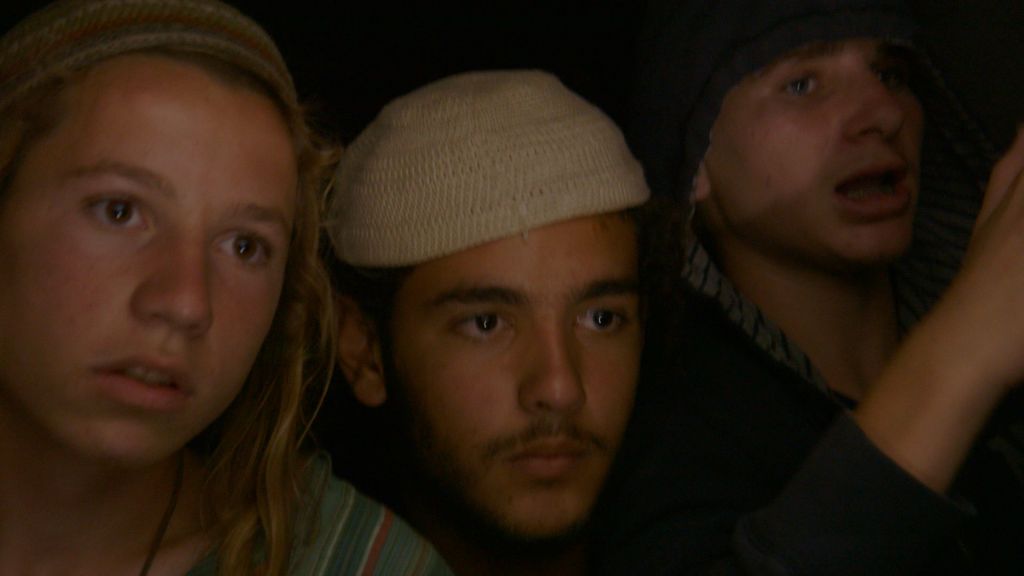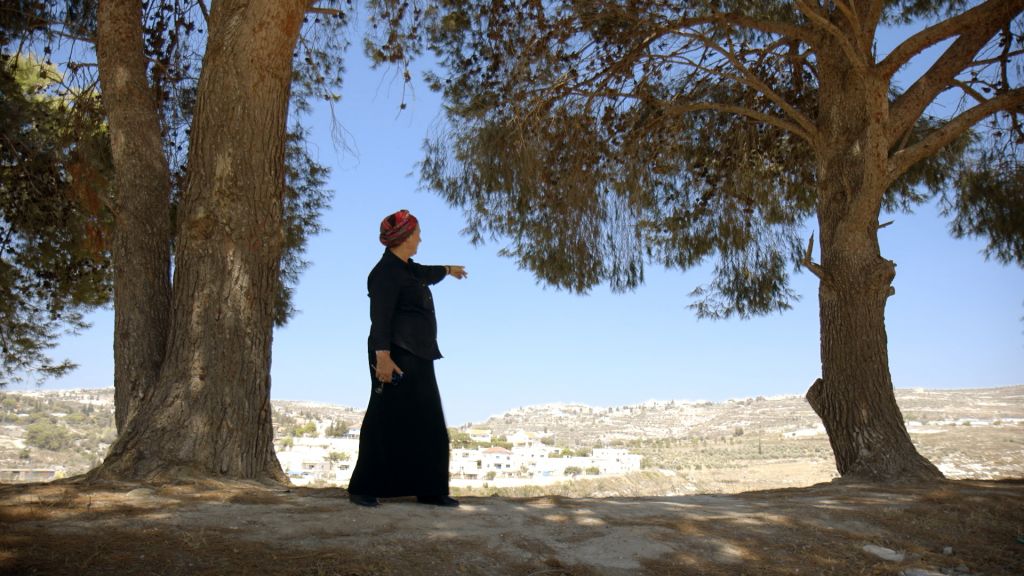‘The Settlers’: An effective work of left-wing propaganda
Shimon Dotan’s disturbing documentary on Jews settling the West Bank raises lingering questions. The film playing opposite it in New York, ‘Ben Gurion, Epilogue,’ offers some answers
By JORDAN HOFFMAN3 March 2017, 6:01 pm
6

Sarah Nachshon in a scene from the documentary 'The Settlers,' directed by Shimon Dotan. (Image courtesy of Philippe Bellaiche)
NEW YORK — I would not say it if it were not true. As I emerged from the press screening of Shimon Dotan’s “The Settlers” I met the eyes of a widely read Jewish-American film critic. With a smile he sighed, “Well, at long last it’s happened — I’ve become an anti-Semite.”
He was kidding, of course, but even those of us who watch movies professionally still fall under their spell. (Perhaps more so, and that’s why we choose this trade.)
Dotan’s documentary, which opens in New York this Friday, is a commendable and effective work of propaganda. It gives you just enough of the “other side” to make it seem fair and balanced.
2/2
Of course, it isn’t — it has an agenda. Any documentary that employs edits and doesn’t stash its cameras behind potted plants does. This makes “The Settlers” frustrating because so much of it is so very good and, as the most thorough film about this ongoing crisis from which there seems no easy escape, it is likely to become something of an authoritative text.
Dotan digs deep, starting with new interviews of Jews in West Bank settlements, then jumping back to historical news footage. We get another look at the 1948 partition plan and the 1967 Six-Day War. Some credit is due for leaving in what so many leave out: that the preemptive 1967 strike was necessary in the face of Nasser’s military build-up, an obvious point that is more and more forgotten as history turns to misremembered mist.

Mordechai Gur (seated, with black curly hair) and his troops survey the Old City before launching their attack, May 1967. (photo credit: Wikimedia Commons CC BY-SA/Mazel123)
The newly occupied land is never discussed in defensive terms. It isn’t really discussed at all, other than something that is “wrong.” (Every other blip in human history concerns boundaries shifting after a military engagement, but, you know, when the Jews do it, it’s wrong. Fine.)
The first settlers, inspired by Rabbi Zvi Yehuda Kook, move into the occupied lands for their own crypto-religious purposes. The government is aware that their actions, like checking into the Park Hotel in Hebron and never leaving, violate the Geneva Conventions, but they look the other way.
It takes a few decades but a snowball effect has begun. “The Settlers” connects the dots between these few fringe players to fanatical groups like today’s Hilltop Youth whose ISIS-like rhetoric continues to strain Israeli society.

A group of settlers are seen in a scene from the documentary ‘The Settlers,’ directed by Shimon Dotan. (Courtesy Philippe Bellaiche)
There is a lot in “The Settlers” that shows how Israel’s religious right-wing treats Palestinians as subhumans with no rights. This is deplorable and must be exposed. But almost every settler we meet in this movie is a zealot, a scumbag or a wacko. Good luck finding a struggling middle-class family unable to find an economically viable home who would gladly pack up the minute either government comes correct with a substantial peace plan. (I’ve met them, they exist.)
Footage of the Intifidas zooms by quickly, and bloodlessly. It’s easier to focus on checkpoints, new highways that criss-cross the land and the ubiquitous old woman crying about olive trees. Every comment chosen for inclusion makes for maximum tongue-clucking. It’s nasty, nasty business.

Daniella Weiss in a scene from the documentary ‘The Settlers,’ directed by Shimon Dotan. (Image courtesy of Philippe Bellaiche)
There’s nothing from any Palestinian leaders and the only Israeli officials we see are the ones fanning the settlements’ flames. We conclude with more cries that “this can’t continue” but absolutely no solutions.
New York’s Film Forum, however, is coyly programming “The Settlers” opposite a second film that, in an indirect way, offers one. “Ben Gurion, Epilogue” is a remarkable documentary that has a long-lost interview with the elderly former prime minister as its spine.
Shot soon after the death of his wife Paula in 1968, 82-year-old Ben-Gurion is in full-on sage mode in Sde Boker. Few statesmen ever had such a strange final act. After co-founding a nation from the ashes of the Holocaust, he retreated to the desert and essentially became the Jewish Yoda. (Don’t tell me there’s no physical resemblance.)

Israeli Prime Minister David Ben-Gurion on the set of the 1968 interview from Yariv Mozer’s ‘Ben-Gurion, Epilogue.’ (Photo by David Marks.)
“Ben-Gurion, Epilogue,” in between sequences of this small, stout man rolling up his sleeves and shoveling manure, is an astounding dialogue with one of our great thinkers. (It’s also a testament to analogue technology. Had this been a digital file it would have just been zapped. Instead the images sat in a vault until the accompanying audio was found elsewhere.) Wisdom shoots from his mouth like fireworks. As does vitality. After hours of talk he looks to his watch and says “we still have 10 minutes left!”)
ADVERTISEMENT
It is also a remarkable time capsule of a film. Most striking is seeing the young nation of Israel as it was perceived by other countries at that time.
The main interview is conducted by a researcher named Dr. Clinton Bailey, a British Jew who had emigrated to Ben-Gurion’s kibbutz. Other footage comes via the BBC and even Edward R. Murrow (this sequence is incredible) as Jewish Ben-Gurion and Buddhist Burmese prime minister U Nu shout warmly at each other over Murrow’s early satellite hook-up.
Though it is only discussed briefly, Ben-Gurion’s attitude to the then newly-acquired occupied lands is clear: Who needs it? There’s plenty of space here in the Negev.
This is a facile answer to a complicated question. Especially considering how the disengagement from Gaza caused such rifts from the religious wing in Israel and left a vacuum for Hamas that, even most leftists would agree, hardly makes the situation any better. But these are strange times. A reality TV star with a string of bankrupt businesses behind him is now President of the United States.
In “Ben-Gurion, Epilogue” director Yariv Mozer includes footage of the famous, elderly Israeli statesman standing on his head. It is an often-mocked image, but it is explained here in terms of someone, even in their 80s, looking for change wherever one can find it. It may not be a bad idea to embrace other perspectives no matter where they come from.
No comments:
Post a Comment